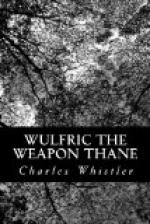“Aye, brother; the girl is right,” said Hubba. “Let him die; for you gave him to Wulfric, and that is his word.”
“Well then,” said Ingvar, setting back the axe at last, “I will not carve him into the eagle I meant to make of him. But slay him I must and will, if the life is yet in him.”
“Let Odin have him,” said Hubba; and I knew that he meant that the man should be hanged, for so, as Halfden’s vikings told me, should he be Odin’s thrall, unhonoured.
Then the maiden fled from the hall, glad to have gained even that for the man, instead of the terrible death that the Danes keep for traitors and cowards.
Now Ingvar put back the axes he had kept, saying that the girl ever stood in his way when he would punish as a man deserved. After that he stood for a while as if in thought, and broke out at length:
“We will see if this man can sing a death song as did Ragnar our forefather.”
And with that he waited no more, but strode out into the courtyard, we following. And I feared what I should see; until I looked on Beorn, and though he was yet alive, I saw that he was past feeling aught.
They bore him out of the village to a place just inside the trenched enclosure, and there were old stone walls, such as were none elsewhere in the place, but as it might have been part of Burgh or Brancaster walls that the Romans made on our shores, so ancient that they were crumbling to decay. There they set him down, and raised a great flat stone, close to the greatest wall, which covered the mouth of a deep pit.
“Look therein,” said Ingvar to me.
I looked, and saw that the pit was stone walled and deep, and that out of it was no way but this hole above. The walls and floor were damp and slimy; and when I looked closer, the dim light showed me bones in one corner, and also that over the floor crawled reptiles, countless.
“An adder is a small thing to sting a man,” said Ingvar in his grim voice. “Nor will it always hurt him much. Yet if a man is so close among many that he must needs tread on one, and it bites him, and in fleeing that he must set foot on another, and again another, and then more—how will that end?”
I shuddered and turned away.
“In such a place did Ella of Northumbria put my forebear, Ragnar Lodbrok; and there he sang the song {xiii} we hold most wondrous of all. There he was set because he was feared, and Northumbria knows what I thought of that matter. But Beorn goes here for reasons which you know. And East Anglia shall know what my thoughts are of those reasons.”
Then two men seized Beorn and cast him into that foul pit, stripped of all things, and the stone fell.
But Beorn moved not nor cried out, and I think that even as Ulfkytel had boded, stripped of life itself was he before the bottom of the pit was reached.
So the justice of Ulfkytel the Earl came to pass. But the lies spoken by Beorn were not yet paid for.




